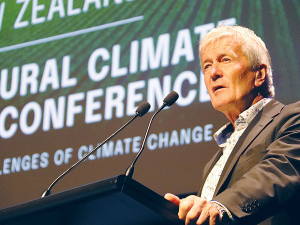Damien O’Connor: NZ united on global trade
When it comes to international trade, politicians from all sides of the aisle are united, says Labour's trade spokesman Damien O'Connor.
 Agriculture Minister Damien O’Connor claims concerns around climate change are driving international consumer preferences.
Agriculture Minister Damien O’Connor claims concerns around climate change are driving international consumer preferences.
Look for market trends, rather than market signals.
That was the key message from Agriculture Minister Damien O'Connor speaking at the recent Agricultural Climate Change conference in the capital.
O'Connor says the reality is that market trends give a longer term view and give producers and marketers more advanced warning of what consumers are looking for, and NZ has to be on the ball, ready to change.
In his opening remarks to the conference, O'Connor made reference to the changes and disruption which are now a part of daily life in the primary sector. He noted the impacts of climate change, proof of which he says is evident in particular by the disastrous trail of damage caused by Cyclone Gabrielle.
"With few exceptions, most people now recognise that climate change is a reality and that we as humans have contributed to it."
O'Connor claims concerns around climate change are driving consumer preferences and this also includes some of the big multi-nationals such as Nestle, which buy our products. He says they have committed to eliminate emissions from their supply chain and says he's not too sure how they will apply that to their individual suppliers such as NZ.
"But clearly those sort of signals show there are some... risks emerging and we may face some barriers," O'Connor added.
"I can tell you that having negotiated the UK and EU FTAs, for the most part, people don't necessarily want our products. We can only feed about 40 million people, so our contribution to global food security is not huge in quantum, but in technology, yes, we can play a bigger part."
O'Connor says NZ has to be at the forefront of food safety, quality, premiumisation and marketing.
He says, at the moment, NZ is not facing any trade barriers in relation to its emissions status, but we ignore the risks at our peril and to future generations.
Changed logos on shirts otherwise it will be business as usual when Fonterra’s consumer and related businesses are expected to change hands next month.
Reflecting on the past year, Horticulture New Zealand chief executive Kate Scott says there has been a lot to celebrate.
Ministry for Primary Industries (MPI) Director General Ray Smith is giving a big shout-out to the horticulture sector, especially kiwifruit.
Early forecasts for New Zealand's apples and pears point to a standout season marked by exceptional fruit quality and high pack-out rates.
Tickets are now available for Beef + Lamb New Zealand’s (B+LNZ) Out the Gate, returning from 19-21 May 2026 at Te Pae, Christchurch.
Dairy Women's Network (DWN) is welcoming AgriHealth as a new partner.

OPINION: Here w go: the election date is set for November 7 and the politicians are out of the gate…
OPINION: ECan data was released a few days ago showing Canterbury farmers have made “giant strides on environmental performance”.